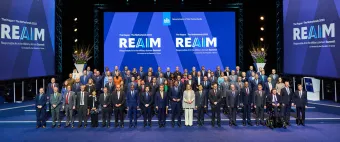Globalizing Responsible AI in the Military Domain by the REAIM Summit

Globalizing Responsible AI in the Military Domain by the REAIM Summit
The first global summit to discuss the responsible development, deployment, and use of artificial intelligence (AI) for defense and military purposes took place in The Hague last month. The Summit on Responsible AI in the Military Domain (REAIM), which the Netherlands co-organized with South Korea from Feb. 15-16, gathered approximately 2000 representatives from across government, industry, academia, and civil society. Among them were 57 States – including all permanent members of the United Nations Security Council, except Russia, and other technologically leading States such as Japan and Germany – that agreed on a joint Call to Action. In addition, the United States presented a Political Declaration to advance States’ engagement on responsible AI, and South Korea announced that it plans to host a second REAIM Summit.
The REAIM Summit broadens international discussions, which currently focus on lethal autonomous weapon systems (LAWS), to more general military and defense-related applications of AI. It also expands understanding of “responsible AI” (RAI), which the United States and NATO frequently reference, to a wider community of States and launches an international political agenda. RAI has the potential to provide a new framework for addressing the related ethical and legal challenges of AI in the military domain at both the international and national levels. Yet it remains to be seen to what degree important actors in the field, such as China and States that aim to ban LAWS completely, such as Latin American and Caribbean States, South Africa, and Austria, will engage in this endeavor.
Tobias Vestner is Director of the Research and Policy Advice Department and Head of the Security and Law Programme at the Geneva Centre for Security Policy (GCSP)
Juliette François-Blouin is a Project Officer within the Security and Law Programme at the Geneva Centre for Security Policy.
Disclaimer: This publication was originally published on Justsecurity. The views, information and opinions expressed in this publication are the author’s/authors’ own and do not necessarily reflect those of the GCSP or the members of its Foundation Council. The GCSP is not responsible for the accuracy of the information
